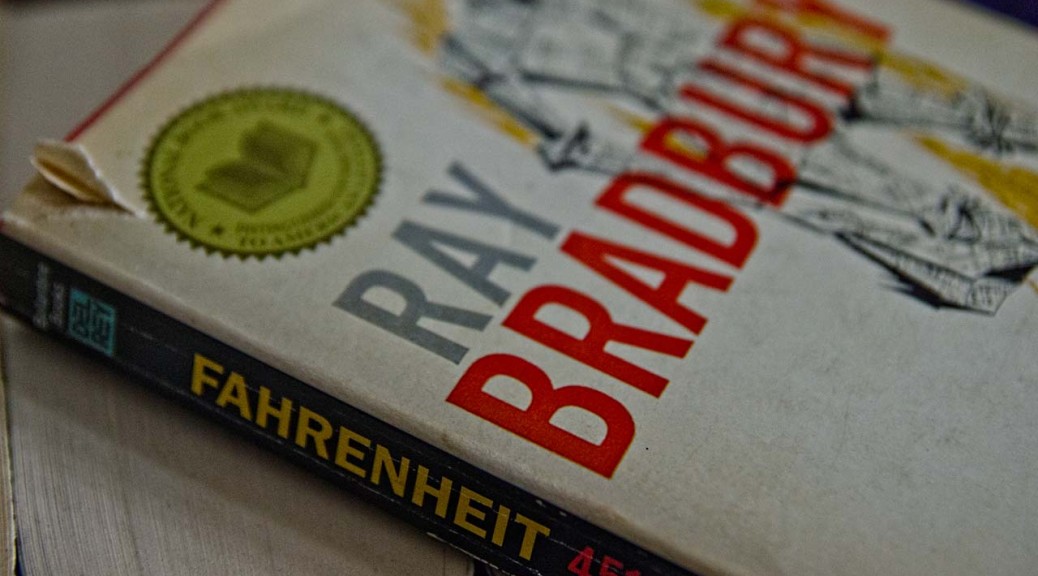
Monthly Archives: September 2016


Product Shots | 1
Check them out at Amazon.com









Fahrenheit 451 | 2
Bradbury, Ray. Fahrenheit 451. New York: Del Rey, 1991. (First Ed. 1953.)
“‘Words are like leaves and where they most abound, Much fruit of sense beneath is rarely found.'” Alexander Pope. p. 106
“Read a few lines and off you go over the cliff. Bangm you’re ready to blow up the world, chop off heads, knock down women and children, destroy authority.” Beatty p. 106
“‘The Devil can cite scripture for his purpose.'” (William Shakespeare | The Merchant of Venice) p. 106
****”Beatty never drove, but he was driving tonight, slamming the Salamander around corners, leaning forward high on the driver’s throne, his massive black slicker flapping out behind so that he seemed a great black bat flying above the engine, over the brass numbers, taking the full wind.” p. 109
“He turned and the Mechanical Hound was there.
It was half across the lawn, coming from the shadows, moving with such drifting ease that it was like a single solid cloud of black-gray smoke blown at him in silence.” p. 120
“lost in pocket of a man who was now nothing but a frame skeleton strung with asphalt tendons.” p. 123
“A great whirling whisper made him look to the sky.
The police helicopters were rising so far away that it seemed someone had blown the gray head off a dry dandelion flower.” p. 125
“He stopped for breath, on his way to the river, to peer through dimly lit windows of wakened houses, and saw the silhouettes of people inside watching their parlor walls and there on the walls the Mechanical Hound, a breath of neon vapor, spidered along, here and gone, here and gone!” p. 137
“He saw many hands held to its warmth, hands without arms, hidden in darkness. Above the hands, motionless faces that were only moved and tossed and flickered with firelight. He hadn’t known fire could look this way. He had never thought in his life that it could give as well as take.” p. 145-146
“But that’s the wonderful thing about man; he never gets so discouraged or disgusted that he gives up doing it all over again, because he knows very well it is important and worth the doing.” p. 153
“‘Stuff you eyes with wonder,’ he said, ‘live as if you’d drop dead in ten seconds. See the world. It’s more fantastic than any dream or paid for in factories. Ask no guarantees, ask for no security, there never was such an animal.” p. 157
“Perhaps the bombs were there, and the jets, ten miles, five miles, one mile up, for the merest instant, like grain thrown over the heavens by a great sowing hand, and the bombs drifting with dreadful swiftness, yet sudden slowness, down upon the morning city they had left behind.” p. 158
“The concussion knocked the air across and down the river, turned the men over like dominos in a line, blew the water in lifting sprays, and blew the dust and made the trees above them mourn with great wind passing away south.” p. 160
Afterword
“I didn’t know it, but I was literally writing a dime novel. In the spring of 1950 it cost me nine dollars and eighty cents in dimes to write and finish the first draft of The Fire Man which later because Fahrenheit 451.” p. 167
“Father had to choose between finishing a story or playing with the girls. I chose to play, of course, which endangered the family income. An office had to be found. We couldn’t afford one.” p. 167
“Thus I was twice drive; by children to leave home, and by a typewriter timing device to be a maniac at the keys. Time was indeed money. I finished the first draft in roughly nine days. At 25,000 words, it was half the novel it eventually would become.” p. 168
“I have scribbled poems about librarians, taken night trains with my favorite authors across the continental wilderness, staying up all night gabbling and drinking, drinking and chatting. I warned Melville, in one poem, to stay away from land (it never was his stuff!) and turned Bernard Shaw into a robot, so as to conveniently stow him aboard a rocket and wake him on the long journey to Alpha Centuri to hear his Prefaces piped off his tongue and into my delighted ear.” p. 168-169
“”It’s not owning books that’s a crime, Montag, it’s reading them!” p. 169-170.
“A last discovery. I write all of my novels and stories, as you have seen, in a great surge of delightful passion.” p. 173
Coda
On censoship and simplicity: “Every story, slenderized, starved, bluepenciled, leeched and bled white, resembled every other story. Twain read like Poe read like Shakespeare read like Dostoevsky read like–in the finale–Edgar Guest. Every word of more than three syllables had been razored.” p. 176
“The point is obvious. There is more than one way to burn a book. And the world is full of people running about with lit matches.” p. 176
“If teachers and grammar school editors find my jawbreaker sentences shatter their mushmilk teeth, let them eat stale cake dunked in weak tea of their own ungodly manufacture.” p. 178
“Take philosophic asides away from Dante, Milton or Hamlet’s father’s ghost and what stays is dry bones. Laurence Stern said it once: Digressions, incontestably, are the sunshine, the life, the soul of reading!” p. 178-179
“At sunset I’ve won or lost. At sunrise, I’m out again, giving it the old try.
And no one can help me. Not even you.” p. 179
A Conversation with Ray Bradbury
“Then, sometime in the late summer of 1953, Playboy came to me. They had no money; they were just starting out, and they asked me if I had something I would sell them for four hundred dollars, so they could get started. So I sold them Fahrenheit 451 for four hundred dollars, and they published it in the second, third, and fourth issues of the magazine.” p. 181
*****”I wrote for years, and I wasn’t paid. My live carried me through all those years. I sold newspapers on the street corner… you’re either in love with what you do, or you’re not in love.” p. 183
“Reading is at the center of our lives. The library is our brain. Without the library, you have no civilization.” p. 184
“It’s not substance; it’s style. The whole problem of TV and movies today is summed up for meby the film Moulin Rouge. It came out a few years ago and won a lot of awards. It has 4,560 half-second clips in it. The camera never stops and hold still. So it clicks off your thinking; you can’t think when you have things bombarding you like that… We bombard people with sensation. That substitutes for thinking.” p. 184
“I wrote the book because I love writing. All my stories are written in bursts of passion.” p. 185
“DR: Do you plot your stories in advance?
RB: NO, no, no. I live my stories.” p. 185
Are you the boss of your characters (tell them what to do)?
“You can’t do that. That’s bad writing. They must write you. They must control you. They plot me. I never control them. I let them have their lives.” p. 185
“I believe that if you do your work everyday, at the end of the week or at the end of the month or at the end of the year, you feel good about all the things you did. It’s based on reality, not a false concept of optimism. So if you behave well, if you write well every day, and act well, at the end of the year you’ll feel good about yourself.” p. 188
“I’ve been influenced by all kinds of Irish writers: George Bernard Shaw, Sean O’Casey, William Butler Yeats, Oscar Wilde… or in England, Charles Dickens. Yes, I was influenced by the nineteenth century American writers who wrote metaphors: Herman Melville and Nathaniel Hawthorne and Edgar Allan Poe.” p. 188
On Federico Fellini “he lived with the following saying: “Don’t tell me what I’m doing; I don’t want to know.” He never looked at his films when he was making them. Never saw the dailies. Only when he finished shooting the film would he sit down with the projector and look at what he had done. I’m the same way. I don’t believe in watching myself.” p. 189
“DR: What books did you fall in love with as a boy?
RB: The Oz books. Tarzan and John Carter, Warlord of Mars, by Burroughs. Jules Verne, at a certain age. Edgar Allan Poe when I was nine. And H. G. Wells, who was very negative but very exciting, because when you’re sixteen years old, you’re paranoid, and H. G. Wells is a very paranoid writer. And a very necessary one.” p. 190
About the Author
“published some 500 short stories, novels, plays, and poems since his first story appeared in Weird Tales… For several years he wrote for Alfred Hitchcock Presents and The Twilight Zone and in 1953 did the screenplay for John Huston’s Moby Dick… collaborated on an animated film, Icarus Montgolfer Wright… When one of the Apollo astronaut teams landed on the moon, they named Dandelion Crater there to honor Bradbury’s novel Dandelion Wine. His novel Something Wicked This Way Comes was made into a major release feature film” p. About the Author
to read:
watch:
Something Wicked This Way Comes | Dir. Jack Clayton | (1983)

Fahrenheit 451 | I
Bradbury, Ray. Fahrenheit 451. New York: Del Rey, 1991. (First Ed. 1953.)
“One time, as a child, in a power failure, his mother had found and lit a last candle and there had been a brief hour of rediscovery, of such illumination that space lost its vast dimensions and drew comfortably around them, and they, mother and son, alone, transformed, hoping that the power might not come on again too soon…” p. 7
“It was like coming into the cold marbled room of a mausoleum after the moon has set. Complete darkness, not a hint of the silver world outside, the windows tightly shut, the chamber a tomb world where no sound from the great city could penetrate.” p. 11
“He felt that the stars had been pulverized by the sound of the black jets and that in the morning the earth would be covered with their dust like a strange snow.” p. 14
“Montag’s hand closed like a mouth, crushed the book with wild devotion, with an insanity of mindlessness to his chest. The men above were hurling shovelfuls of magazines into the dusty air. They fell like slaughtered birds and the woman stood below, like a small girl, among the bodies.” p. 37

Hugh Latimer and Nicholas Ridley martyred by being burnt at the stake. John Foxe’s book of martyrs. 1563 edition. Via Wikimedia.
“”‘We shall this day light such a candle, by God’s grace, in England, as I trust shall never be put out,'” said Beatty…. “A man named Latimer said that to a man named Nicholas Ridley, as they were being burnt alive at Oxford, for heresy, on October 16, 1555.”” p. 40
“”I had a nice evening,” She said, in the bathroom.
“What doing?”
“The parlor.”
“What was going on?”
“Programs.”
“What programs?”
“Some of the best ever.”
“Who?”
“Oh, you know, the bunch.”” p. 49
“The parlor was exploding with sound.
“We burnt copies of Dante and Swift and Marcus Aurelius.”
“Wasn’t he European?”
“Something like that.” p. 50
“And I thought about books. And for the first time I realized that a man was behind each one of the books. A man had to think them up. A man had to take a long time to put them down on paper. And I’d never even thought that thought before.” p. 52
“Books cut shorter. Condensations. Digests. Tabloids. Everything boils down to the gag, the snap ending.”
“Snap ending,” Mildred nodded.
“Classics cut to fit fifteen-minute radio shows, then cut again to fill a two-minute book column, winding up at last as a ten- or twelve-line dictionary resume.” p. 54
“Speed up the film, Montag, quick. Click, Pic, Look, Eye, Now, Flick, Here, There, Swift, Pace, Up, Down, In, Out, Why, How, Who, What, Where, Eh? Uh! Bang! Smack! Wallop, Bing, Bong, Boom! Digest-digests, digests-digests-digests. Politics? One column, two sentences, a headline! Then, in midair, all vanishes! Whirl man’s mind around about so fast under the pumping hands of publishers, exploiters, broadcasters that the centrifuge flings off all unnecessary, time-wasting thought!” p. 55
“The bigger your market, Montag, the less you handle controversy, remember that!” p. 57
“With school turning out more runners, jumpers, racers, tinkerers, grabbers, snatchers, fliers, and swimmers instead of examiners, critics, knowers, and imaginative creators, the word ‘intellectual,’ of course, became the swear word it deserved to be.” p. 58
“We must all be alike. Not everyone born free and equal, as the Constitution says, but everyone made equal. Each man the image of every other; then all are happy, for there are no mountains to make them cower, to judge themselves against.” p. 58
“”Colored people don’t like Little Black Sambo. Burn it. White people don’t feel good about Uncle Tom’s Cabin. Burn it. Someone’s written a book on tobacco and cancer of the lungs? The cigarette people are weeping? Burn the book.”” p. 59
“If you don’t want a man unhappy politically, don’t give him two sides to a question to worry him; give him one. Better yet, give him none. Let him forget there is such a thing as war. If the goverment is inefficient, topheavy, and tax-mad, better it be all those than that people worry over it. Peace, Montag. Give the people contests they win by remembering the words to more popular songs or the names of state capitals or how much corn Iowa grew last year. Cram them full of noncombustible date, chock them so damned full of ‘facts’ they feel stuffed, but absolutely ‘brilliant’ with information. Then they’ll feel they’re thinking, they’ll get a sense of motion without moving.” p. 61
“the real reason, hidden underneath, might be they didn’t want people sitting like that, doing nothing, rocking, talking; that was the wrong kind of social life. People talked too much. And they had time to think.” p. 63
“”‘We cannot tell the precise moment when friendship is formed. As in filling a vessel drop by drop, there is at last a drop which makes it run over; so in a series of kindnesses there is at last one which makes the heart run over.'”” p. 71
“Books were only one type of receptacle where we stored a lot of things we were afraid we might forget. There is nothing magical in them at all. The magic is only in what books say, how they stitched the patches of the universe together into one garment for us.” p. 82-83
“That’s my definition, anyway. Telling detail. Fresh detail. The good writers touch life often. The mediocre ones run a quick hand over her. The bad ones rape her and leave her for the flies.” p. 83
“Number one, as I said: quality of information. Number two: leisure to digest it. And number three: the right to carry out actions based on what we learn from the interaction of the two.” p. 84-85
“The things you’re looking for, Montag, are in the world, but the only way the average chap will ever see ninety-nine per cent of them is in a book.” p. 86
“A minute later, Three White Cartoon Clowns chopped off each other’s limbs to the accompaniment of immense incoming tides of laughter. Two minutes more and the room whipped out of town to the jet cars wildly circling an arena, bashing and backing up and bashing each other again. Montag saw a number of bodies fly in the air.” p. 94
“Fat, too, and didn’t dress to hide it. No wonder the landslide was for Winston Noble. Even their names helped. Compare Winston Noble to Hubert Hoag for ten seconds and you can almost figure the results.” p. 97
“By the time I was forty my blunt instrument had been gone to a fine cutting point for me. If you hide your ignorance, no one will hit you and you’ll never learn.” p.104
to read:
Martian Chronicles (1950)
To watch: Fahrenheit 451 (1966) | Dir. François Truffaut |

Tongyang to Bijin-do

Jinhae to Tongyang

Busan to Jinhae
Lincoln Lawyer
Watched The Lincoln Lawyer (2011) Dir. Brad Furman | D.P. Lukas Ettlin
Capote
Watched Capote (2005) | Dir.: Bennett Miller (Moneyball, 2011; Foxcatcher, 2014, ) To watch The Cruise (1998)

















